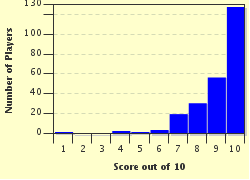Quiz Answer Key and Fun Facts
1. The nursery rhyme, 'One, Two, Buckle my Shoe', is a great way to learn to count to ten. What rhyme is used for the number 10?
2. Animals feature a lot in nursery rhymes. In the rhyme 'Baa, baa, black sheep', how many bags of wool did the sheep have?
3. One of my favourite nursery rhymes is 'Humpty Dumpty'. Often portrayed as an egg, the story tells that Humpty fell off a great wall, and so was broken. Was he able to be put back together again?
4. Everyone knows the story of Jack and Jill. They went up the hill to fetch a pail of water. "Jack fell down and broke his crown". What method did he use to mend his broken crown (head)?
5. Another nursery rhyme featuring a Jack is 'Jack Sprat'. Jack Sprat could eat no fat, but what could his wife not eat?
6. Another popular counting nursery rhyme is 'Hickory, Dickory, Dock'. Who or what ran up the clock?
7. Nursery rhymes are often used as lullabies, to help put babies to sleep. One of the most popular is 'Rock-a-bye Baby'. In this nursery rhyme, what is the baby being rocked in?
8. A lot of nursery rhymes are put to music, and one recognisable one is 'Bobby Shafto's gone to sea'. What did Bobby Shafto wear on his knees?
9. Often nursery rhymes have a moral lesson. 'Ding, Dong, Bell' is a tale of a poor pussy cat in a well. Little Johnny Flynn put the cat in the well, but who pulled her out?
10. For the final question we turn to another Jack. This time the rhyme is 'Jack be Nimble'. What item did Jack jump over?
Source: Author
Luckycharm60
This quiz was reviewed by FunTrivia editor
looney_tunes before going online.
Any errors found in FunTrivia content are routinely corrected through our feedback system.

